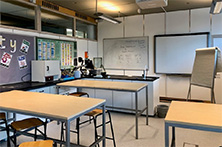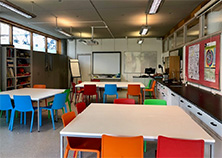Science: Biology, Chemistry or Physics Initial Teacher Education
 Your enthusiasm for science is the starting point for developing the skills and knowledge required to become an inspiring and engaging science teacher. You will bring the subject to life for the young people you work with in biology, chemistry and physics up to GCSE level and your specialism at Post 16/A level.
Your enthusiasm for science is the starting point for developing the skills and knowledge required to become an inspiring and engaging science teacher. You will bring the subject to life for the young people you work with in biology, chemistry and physics up to GCSE level and your specialism at Post 16/A level.
How you can expect to learn
Throughout this course you will be encouraged to critically engage with the issues around science education and to develop your own personal philosophy of teaching and learning. We seek to create a safe and open learning environment for you to learn and develop this understanding and perspective.
You will be encouraged to work creatively and imaginatively in exploring ways to bring the science curriculum to life in your classrooms. University science subject days will be largely spent in a group with all three science disciplines. However, you will also spend time working in specialism groups with a focus on teaching your chosen science.
We value practical learning in science and take full advantage of our purpose-built, classroom design laboratories. You will use the laboratories to learn about health and safety and risk assessments, teaching the required practical elements of the science curriculum, and enhancing learning in the subject through active, practical engagement. You are encouraged to practice any practical work in university before teaching them in school, and we are fully equipped to support you with this.
School of Education science laboratories used for teacher training.


How you will be supported and developed
From the outset you will be part of a collaborative community of science teachers. You will draw on your experiences and the experiences of others to explore the key aspects of learning and teaching science.
In collaboration with experienced teachers in our partnership schools you will consider the everyday reality of teaching science, while at the same time exploring the challenges and issues underpinning science education in our fast-changing world.
Wider opportunities
We are committed to providing equality in education for all children and therefore all our work will be underpinned by the promotion of social justice and concern for educating the whole child. The course will encourage you to explore different approaches to diversity and inclusion in science and consider the impact of current social issues on pupil engagement, participation, and attainment.
You will be able to work with children in alternative school settings to broaden your understanding of the challenges being navigated by teachers and children in schools today. We offer lots of wider opportunities to engage with science in different contexts, such as using the outdoor classroom, and planning science field trips.
Our trainee teachers are encouraged to reflect on their experiences in school to develop their understanding of teaching and how children learn science in schools. As their ‘teacher’, being part of this process is very exciting; hearing students make sense of their experiences in school using ideas from theory and practice, and then seeing them develop their own teaching in the classroom when we visit them in school is fantastic.
Jo Hancock
Secondary PGCE Science Course Leader
See all staff profiles
I had trouble verbalising why I wanted to be a teacher at the beginning of the course. Having now taught a couple hundred lessons, teaching truly is a job like no other. Every single day is different, and every single student brings something unique into your classroom. Even in just one year, I already have had so many incredible experiences, and I know there will be many more. Teaching is challenging, but it is also genuinely fun!
Olivia Harrison
Secondary PGCE Science student
See all alumni profiles